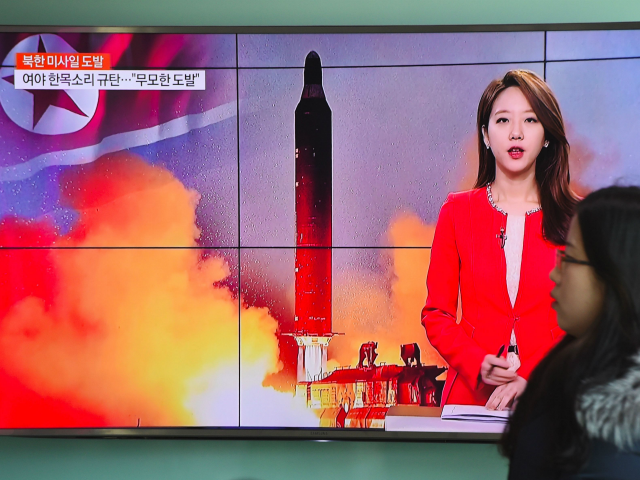North Korea’s military fired two projectiles believed to be short-range missiles into the Sea of Japan, or East Sea, on Thursday that authorities believe may be a new model of weapon.
The launch is the first since May, when it fired one projectile it proclaimed to be part of a “self-sustaining war deterrence” system meant to keep “tyranny and fanaticism” – except for the tyranny and fanaticism of Kim Jong-un’s communist regime – at bay. It follows the abduction of two South Korean sailors on a Russian ship North Korea claims violated its territorial sovereignty and the debut of an allegedly new North Korean submarine.
“North Korea fired one short-range missile at around 5:34 a.m. and the other at 5:57 a.m., from Hodo Peninsula near its eastern coastal town of Wonsan into the East Sea,” South Korea’s Joint Chiefs of Staff (JCS) confirmed Thursday, according to the South Korean news agency Yonhap. Both landed in the Sea of Japan. The JCS stated that its initial review of the weapons suggested that at least one of the two missiles was a new model. Seoul could not confirm if the missiles were ballistic or could carry nuclear warheads.
“We believe that (North Korean leader) Kim Jong-un has recently stayed in the region, and summertime military drills are now underway in the North,” a South Korean JCS officer told Yonhap.
If perfected, the short-range missiles pose a threat to South Korea and Japan – North Korea’s most prominent enemies in the region – but are not believed capable of reaching any American territory. North Korea and South Korea remain technically at war since 1950, having never signed a peace treaty. An armistice agreement signed in 1953 ended the active period of the Korean War.
The North Korean communist regime claims to be currently engaging in “routine” military exercises. According to government media, the nation is also preparing to observe Day of Victory in the Great Fatherland Liberation War, a holiday celebrating the 1953 armistice agreement signed on July 27. North Korea did not technically achieve victory in the “Fatherland Liberation War” because, as noted above, the Korean War never formally ended.
The missile launches follow the debut in state media of a submarine that the North Korean military claims can carry ballistic missiles. South Korea’s Chosun Ilbo newspaper identified the vehicle from the photos the government released as likely to be a “remodeled old Soviet Golf-class sub.”
“The Soviet Union deployed the Golf from the late 1950s until the early 90s. It was 98.9 m long with a submerged displacement of 3,500 tons and was capable of carrying three ballistic missiles,” Chosun Ilbo reported, noting that the North Koreans purchased a model that was “hardly more than scrap” but appear to have refurbished it.
North Korea appears to have shifted back to testing short-range weapons as its relationship with the United States improved. Pyongyang is not known to have tested an intercontinental ballistic missile (ICBM) or a nuclear weapon since November 2017. The last short-range missile test, in contrast, occurred in May. On that occasion, North Korea’s state newspaper Rodong Sinmun declared the rogue state an “invincible power that has fulfilled the historic cause of parallel development.” It described the military’s missile testing as “defensive,” however, insisting that “hostile forces” – a term typically referring to the United States and South Korea, though Pyongyang also often disparages Japan – made the missiles necessary.
Kim Jong-un has insisted through his monopoly on media in the country that his personal relationship with President Donald Trump is thriving. Kim most recently met with Trump in Panmunjom, a village in the Demilitarized Zone (DMZ), in late June after Trump abruptly suggested a meeting following his travels to Japan for the annual G-20 summit. Rodong Sinmun and the other North Korean media outlets declared the meeting a diplomatic victory, though some reports suggested that North Korean hardliners doubted the effectiveness of legitimizing Trump in the eyes of the indoctrinated North Korean people in such a manner.
“North Koreans are now criticizing the fact that the Highest Dignity rushed to meet the president,” an unidentified source told Radio Free Asia (RFA) after the meeting.
The relationship between Pyongyang and Seoul, in contrast to that with Washington, remains frigid. The North Koreans are currently demanding that South Korea cancel joint military exercises with the United States, but apparently pressuring only Seoul. The North Korean government this week rejected a regular shipment of food aid for its people in protest of the routine exercises. The shipment is meant to offset potential negative humanitarian consequences of the international sanctions currently stifling the North Korean economy, imposed as a response to the 2017 nuclear test.
“The government hopes that the shipment of 50,000 tons of rice will be completed by September as originally planned,” South Korean Ministry of Unification deputy spokesperson Kim Eun-han said this week.
A report published last week revealed that North Korea has lost as much as half of its overall trade volume in the past year as a result of sanctions. North Korea currently depends heavily on trade with Russia and China – permanent members of the United Nations Security Council who did not impede the sanctions despite their friendly ties with Pyongyang – but the communist regime lost nearly half its trade volume even with China, a government routinely accused of violating sanctions.

COMMENTS
Please let us know if you're having issues with commenting.